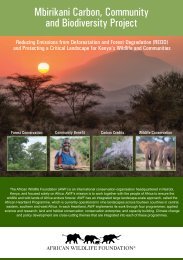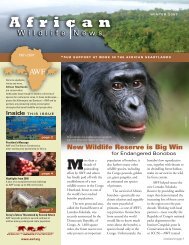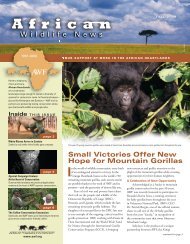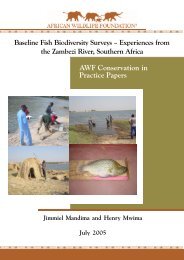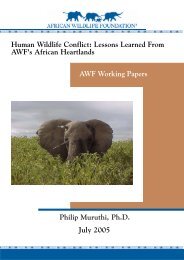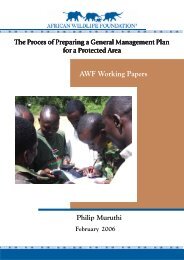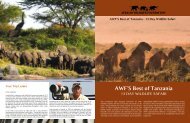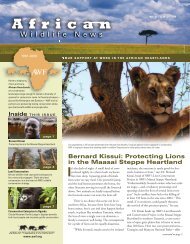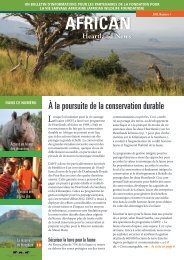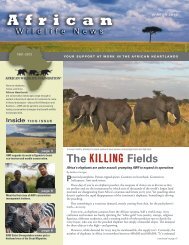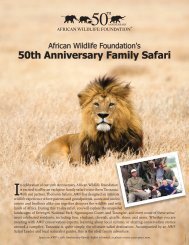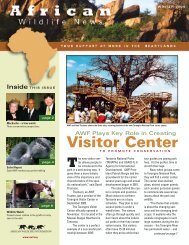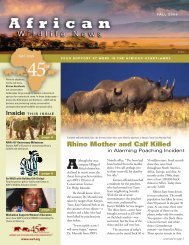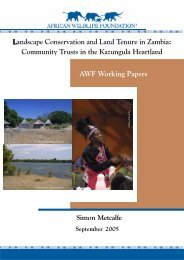Making a Difference? - African Wildlife Foundation
Making a Difference? - African Wildlife Foundation
Making a Difference? - African Wildlife Foundation
Create successful ePaper yourself
Turn your PDF publications into a flip-book with our unique Google optimized e-Paper software.
MAPS DESIGNED BY ADAM HENSON/AWFAWF History Continued from page 15In 2000, AWF opened Conservation ServiceCenters in Victoria Falls, Zimbabwe, and inWhite River, South Africa, bringing the totalnumber of centers to four.Following a decade of war and genocide inRwanda, Eugène Rutagarama, programmanager of the International Gorilla ConservationProgramme (IGCP), received theGoldman Environmental Prize for his effortsto protect Rwanda’s tropical forests and theapproximately 320 mountain gorillas in theregion.And as AWF celebrated its 40th year, itlaunched a public awareness initiative with aseries of public service advertisements createdand donated by Leo Burnett USA. AWF structuredits ads and publications to lead readersto the organization’s web site in order to communicateAWF’s conservation message to abroad audience. ❍AWF in Africa…Over the past 40 years, AWF has supportedwildlife conservation projects throughoutmuch of the continent, as illustrated in themap of Africa below. The second mapshows in greater detail the many specificlocations where AWF has worked.<strong>African</strong> <strong>Wildlife</strong> News<strong>Difference</strong> Continued from page 1corridors and forms a linking protected area.These are true, tangible victories to celebrate.Our knowledge has also grown over the last40 years. In 1961, many people considered theelephant to be a pest, a wild animal or, at best,a “resource.” Today we understand the complexsocial life of elephants, thanks toresearchers like Cynthia Moss, Joyce Pooleand Katie Payne. Forty years ago, researchersdid brief studies on individual predators; nowwe see the interaction among lions, cheetahs,wild dogs and hyenas as part of a fabric ofintact ecosystems that spreads across a vastlandscape. And we are just beginning tounderstand the accumulated wisdom andlogic behind previously derided, traditionalpastoral systems as a way to sustain livelihoodsin a harsh and uncertain environment.We are gaining a new respect for pastoralism’srole in keeping land open for wildlife.There are other positive changes. Whenthe <strong>African</strong> <strong>Wildlife</strong> Leadership <strong>Foundation</strong>,our precursor, was established in 1961, no<strong>African</strong>s were professionally trained inwildlife management. Now, virtually everypark system on the continent is led by trained<strong>African</strong> professionals as well as a growingcadre of young <strong>African</strong> scientists. For wildlifeconservation to ultimately sustain itself, theimpassioned voices for protection must comefrom leadership within Africa. But still thereis work to be done: Too many of these leaderslack the political support and financialresources needed to do their jobs effectively.So while we mourn the loss of so muchwildlife over the last four decades, we can takeconsiderable pride that, in many cases, wehave been able to slow, stop and even reversethe slide of animals toward extinction. And welook to a future where we can begin to returnpreviously depleted lands to their formerwildlife richness—as now is being done inSouth Africa. Some groups assert that they cansave everything, while others say most speciesface imminent doom. Neither claim is true.The reality is that we can save much of Africa’swildlife, but there will be one step back forevery two steps forward. Disarray in the Zambia<strong>Wildlife</strong> Department recently has led to analarming outbreak of poaching—some of itattributed to the very people charged withwildlife protection. The bushmeat trade continuesto flourish, and the status of the forestelephants (which represent perhaps half ofAfrica’s elephants) remains perilous in themidst of a multi-country war—a war driven byour own thirst for Africa’s mineral wealth.<strong>African</strong> <strong>Wildlife</strong> <strong>Foundation</strong>, its staff andsupporters have made an enormous differenceover the last 40 years. Without question, ifAWF had not existed, much of the continentwould be a far poorer place for wildlife. Thepeople discussed in this issue of <strong>African</strong><strong>Wildlife</strong> News, and too many others to mention,deserve the credit. We must look to thenext 40 years with hope, determination, resolveand the recognition that the price of savingAfrica’s wildlife will be eternal vigilance. ❍1400 Sixteenth Street, N.W. Suite 120Washington, DC 20036Non-ProfitOrganizationU.S. PostageP A I D8062Washington, DCReturn Service Requested. Please let us know if you are receiving duplicate copies by returning the mailing labels.F ALL 200116



